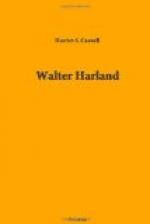question, and all the leisure time I could command
I spent in teaching my children. Nathan was slow
at learning, but it did beat all, how smart Lucinda
was at her book. I could never tell how she learned
her letters; I may say she picked them up herself,
and with a very little assistance was soon able to
read. Other settlers came among us from time
to time, and bye-and-bye we had both a school and a
meeting-house. I tell you, Walter, when I now
sit at the door, and look around me over the beautiful
farms, with their orchards and smooth meadow-lands,
and further away the gleaming spire of the village
church, and hear the sharp shriek of the locomotive
(I believe they call it) and call to mind the log-hut
in the depth of the forest, which was, my first home
on this farm, I am lost in wonder at the changes which
have taken place, and I cannot help repeating the
words, ’old things have passed away, behold
all things have become new.’ Your grandfather
lived to a good old age, and, when infirmities obliged
him to resign the care of the farm to our boy Nathan
he enjoyed the fruits of his former industry in the
comforts of a home of plenty, and the care and attention
of our dutiful children. As for me I do not now
look forward to a single day. I have already
outlived the period of natural life and feel willing
to depart whenever an all-wise Providence sees fit
to remove me; but I would not be impatient and would
say from my very heart: ’All the days of
my appointed time will I wait till my change comes.’
And now, Walter, read to me, for it is past my usual
time of retiring to rest.” As I closed
the book (after reading for half an hour) Grandma said,
“I have read myself, and heard others read the
Bible these many years, yet each time I listen to
a chapter, I discover in it some new beauty which I
had never noticed before. Truly the Bible is
a wonderful book; it teaches us both how to live and
how to die.”
CHAPTER XX.
“I wish you would go over to the post office,
Nathan,” said my aunt one evening in the latter
part of winter; “none of us have been over to
Fulton this week, and who knows but there may be letters,”
“Who knows indeed!” replied Uncle Nathan,
“I am as you say a careless mortal, and never
inquired for letters the last time I was over, so I’ll
just harness up and drive over this clear moonlight
evening.” He returned in an hour’s
time and soon after entering the house, handed a letter
to my aunt saying, “read that and see what you
think of it.” Seating herself and adjusting
her glasses, she unfolded the letter, and perused it
carefully; but any one acquainted with her would at
once have been aware, by the expression of her countenance,
as she read, that the communication, whatever it was,
was not of an agreeable nature. The letter was
from a cousin residing in the State of Massachusetts
whom they had not seen for many years, but who used
in his youthful days to be a frequent visitor.




